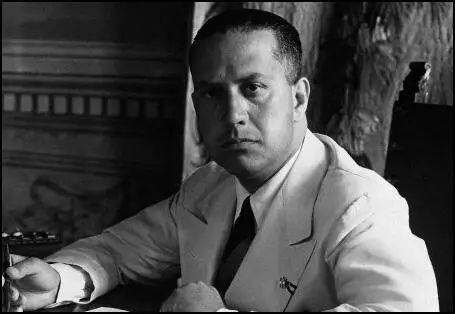Galeazzo Ciano
Galeazzo Ciano was born in 1903. He held several diplomatic posts in Brazil, Argentina and China before marrying Edda Mussolini, the daughter of Benito Mussolini in 1930.
In 1935 Mussolini appointed Ciano as Minister of Propaganda. The following year he became Minister of Foreign Affairs. Ciano was put in command of a bomber squadron and flew on several missions during the war against Ethiopia (1935-36).
Ciano was a supporter of the alliance with Germany but objected to the way that Adolf Hitler ordered the invasion of Poland without consulting with Italy, as required by the terms of the treaty. He wrote that he had lost trust Joachim von Ribbentrop, the German foreign minister: "Ribbentrop is evasive. Whenever I ask him for particulars about German policy his conscience troubles him. He has lied too many times about German intentions towards Poland not to feel uneasy now about what he must tell me, and what they are really planning to do. The German decision to fight is implacable. Even if they were given more than they ask, they would attack just the same, because they are possessed by the demon of destruction.

Benito Mussolini followed Ciano's advice to keep out of the Second World War until the fall of France in May, 1940. In 1942 Ciano became increasingly dissatisfied with the way Benito Mussolini was running the country. After a series of heated arguments with Mussolini, Ciano resigned as foreign minister in February, 1943.
Galeazzo Ciano remained a member of the Fascist Grand Council and argued that Italy should sign a separate peace with the Allies. He also voted for Mussolini to be replaced by Pietro Badoglio.
Ciano left Rome after Mussolini's was overthrown but he was captured by the German Army. On the orders of Benito Mussolini Ciano was given a mock trial and was sentenced to a "traitors" death - being shot in the back while tied to a chair on 11th January, 1944.
Primary Sources
(1) Galeazzo Ciano, diary entry (2nd November, 1937)
A very hostile speech from Eden. It was only to be expected. He can't reconcile himself to his loss of face over Abyssinia and is trying to land us a kick in the shins. I have drafted Informazione Diplomatica which is a good reply. An even better reply will be the signing on Saturday of the Tripartite Pact, anti-Communist in theory but in fact unmistakably anti-British.
(2) Galeazzo Ciano, diary entry (9th May, 1938)
The farewell between Hitler and Mussolini at the station was very affectionate. Both men were moved. The Duce said: "Henceforth no force will be able to separate us." Hitler's eyes were full of tears.
(3) Galeazzo Ciano, diary entry (30th September, 1938)
At last, at one in the morning, the document is completed. Everybody is satisfied, even the French - even the Czechs, according to what Daladier tells me.
Ribbentrop has handed me a project for a tripartite alliance between Italy, Germany, and Japan. He says it is the "biggest thing in the world". He always exaggerates, Ribbentrop.
(4) Galeazzo Ciano, diary entry (11th August, 1939)
Ribbentrop (German foreign minister) is evasive. Whenever I ask him for particulars about German policy his conscience troubles him. He has lied too many times about German intentions towards Poland not to feel uneasy now about what he must tell me, and what they are really planning to do. The German decision to fight is implacable. Even if they were given more than they ask, they would attack just the same, because they are possessed by the demon of destruction.
(5) Galeazzo Ciano, diary entry (13th May, 1941)
Von Ribbentrop arrives in Rome unexpectedly. He is discouraged and nervous. He wants to confer with the Duce and me for various reasons, but there is only one real reason: he wants to inform us about the Hess affair....
The official version is that Hess, sick in body and mind, was a victim of his pacifist hallucinations, and went to England in the hope of facilitating the beginning of peace negotiations. Hence, he is not a traitor; hence he will not talk; hence, whatever else is said or printed in his name, is false. Ribbentrop's conversation is a beautiful feat of patching things up. The Germans want to cover themselves before Hess speaks and reveals things that might make a great impression in Italy.
Mussolini comforted von Ribbentrop, but afterwards told me that he considers the Hess affair a tremendous blow to the Nazi regime. He added that he was glad of it, because this will have the effect of bringing down German stock, even with the Italians.

